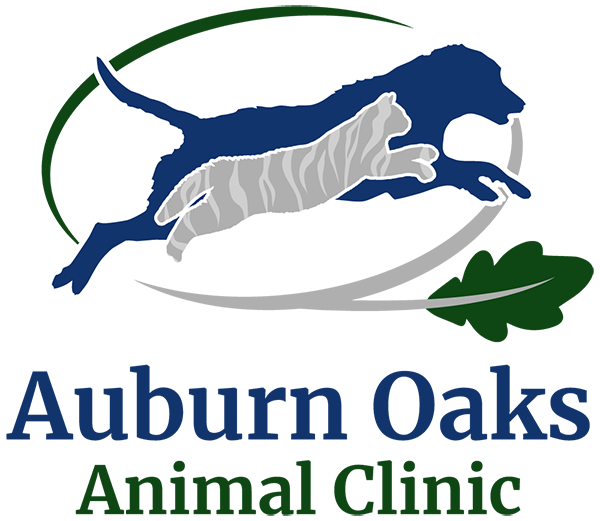Auburn Oaks Animal Clinic offers a wide range of veterinary services for our patients. Just a few of our wellness and preventive care services are listed below.
Puppy & Kitten Care
Getting your new puppy or kitten off to a healthy start sets the stage for their lives as healthy adults. Regular physical examinations, core and elective vaccinations, fecal testing for parasites, and deworming are all important elements of ensuring good health for your puppy or kitten. Our knowledgeable staff can help your family learn about potty training your pup, provide guidance on keeping your young pet safe, and offer dietary and feeding recommendations.
Spaying and neutering: The appropriate age for the timing of sterilization surgery may vary upon the species and breed of your pet. You may also want to consider Pet Health Insurance – a great way to get your new little family member off to a good start. Finally, you’ll want to ensure your new puppy or kitten is treated with preventives to protect them from heartworm and flea/tick borne diseases. We realize that adding a new family pet can come with lots of questions… but don’t forget, we’re here to help, so please don’t hesitate to call.
Wellness Care
Preventive veterinary care is the cornerstone of keeping your pet healthy so that you and your pet can have more great years together. Since pets age more quickly than people do, it is critical to have regular physical examinations done to assess your pet’s health. During routine preventive exams, your veterinarian will assess:
- Overall Body Condition
- Eyes
- Ears
- Nose
- Mouth
- Throat
- Heart and Lungs
- Abdominal Organs
- Musculoskeletal System
- Neurologic System
- Urogenital System
- Lymph Nodes
- Skin/Coat
When health problems are identified, a medical plan will be outlined to evaluate the problems in depth. If your pet appears to be healthy enough for routine preventive care, your veterinarian will discuss which immunizations are advised, as well as parasite prevention including heartworm disease, intestinal parasites, and ectoparasites (fleas, ticks, etc.). Annual age-appropriate lab tests, testing for heartworm and/or tick-borne diseases, and fecal tests for parasites may also be recommended for your pet. Finally, your pet’s nutrition, diet, and exercise routines can be assessed and optimized to help your pet be in best physical condition for their lifestyle and age. Remember, keeping up with preventive care for your pet is the best way to keep your pet happy and healthy for life.
Senior Pet Care
We love Senior Pets! Senior pets have special needs and benefit from more regular veterinary visits compared to their younger counterparts. Age-associated conditions include:
- Arthritis
- Dental Disease
- Heart Disease
- Liver Disease
- Kidney Disease
- Endocrine Disorders
These conditions will start to become more prevalent as your pet gets older. For this reason, we recommend twice-yearly veterinary visits for pets over 7 years of age. Your aging pet may be showing early signs of osteoarthritis such as stiffness after rest or play, difficulty going up or down stairs and reduced activity. Early intervention with joint supplements and prescription arthritis medications when indicated, along with modified nutrition and exercise plans, can greatly improve your pet’s comfort and mobility. In addition, performing annual screening lab work on your older pet can help identify early stages of medical problems that might go unrecognized and progress significantly without treatment.
Some pets experience age-related behavioral changes that can be a sign of cognitive dysfunction, which is similar in some ways to dementia. We can recommend diet modification and supplements to help improve your older pet’s mental sharpness. Getting older doesn’t have to be fraught with troubles for your pet… see us regularly to help keep your senior pet healthy and comfortable.
Parasite Control
Pets are a part of our families, and preventing parasite infestations is an important part of keeping them healthy. Both ectoparasites (external parasites) and endoparasites (internal parasites) can affect your pet at some point in their life.
Ectoparasites, such as fleas and ticks, are not only a nuisance to your pet but can transmit vector-borne diseases to humans and pets such as Bartonella (cat scratch disease, transmitted by fleas), Lyme, Anaplasmosis, Ehrlichia, and Rocky Mountain Spotted Fever. Fleas can also cause a severe dermatologic condition for your pet resulting in very itchy, inflamed skin due to flea allergy dermatitis.
Roundworms are the most prevalent endoparasite in pets. Others include hookworms, whipworms, and tapeworms. Pets are typically infected with these parasites through accidental ingestion of parasite eggs (which are microscopic) from areas that have fecal contamination from other infected animals. Alternatively, some parasites are acquired through ingestion of intermediate hosts such as rodents (Taenia tapeworm species; Toxocara roundworm species) or fleas (Dipyllidium tapeworm species). These parasites are also a health risk to humans and are considered zoonotic – meaning they can be transmitted from animals to people. For example, if a person accidentally ingests roundworm eggs, the larvae can migrate in the body and cause organ damage and potentially blindness. Hookworm larvae in the soil and grass can infect bare skin and cause a condition in people known as cutaneous larval migrans.
Heartworm infections are spread from dog to dog by infected mosquitos. The larval form of the heartworm travels through the bloodstream to the heart where it develops into an adult. The adult heartworms live in the right side of the heart and left untreated result in progressive heart failure and death. In the initial stages of heartworm disease, pets may be asymptomatic. As the condition progresses, symptoms including a cough and exercise intolerance in dogs, and vomiting/coughing in cats may evolve. Treatment of heartworm disease can be very risky for the pet and very costly for the owner.
Because of the health risk to your family and pets, it is important to keep your pet on a year-round parasite prevention program. There are several preventives that when used properly, are very effective at greatly reducing the risk of your pet acquiring heartworm disease, intestinal parasites, and tick-transmitted diseases. Additionally, you can help prevent the risk of zoonotic disease to your family by practicing good hygiene (frequent hand washing), avoiding eating unwashed raw vegetables or undercooked meats, and cleaning up pet feces in your yard. For more information about pets and parasites, visit petsandparasites.org, and consult with one of our friendly staff!
Vaccines
Vaccines for Dogs
- Rabies Virus – Required every year by state law
- Parvo Virus – Critical (particularly for younger dogs)
- Canine Distemper Virus/ Canine Adenovirus-2 – Critical (particularly for younger dogs)
- Parainfluenza Virus/Bordetella Bronchiseptica aka “Kennel Cough” – Highly recommended for all dogs that interact with other dogs, e.g. go to boarding, daycare, dog parks or the groomer. Kennel Cough is highly contagious and can even be spread on people’s clothes from one dog to another. We feel all dogs without other health concerns should be vaccinated.
- Leptospirosis – Recommended for dogs that spend a significant amount of time outdoors, particularly with areas of standing water (even temporary). Leptospirosis is a bacterial pathogen that causes kidney and liver disease. It is an emerging disease spread in the urine of wildlife such as deer, raccoons, opossums, etc. Leptospirosis can be transmitted to any mammal including people.
- Canine Influenza Virus (CIV) – We recommend discussing the merits of vaccination on a case-by-case basis. There are two strains, H3N8 and H3N2. CIV is not seasonal like human strains, but regional outbreaks can occur. The vaccines are recommended for dogs that spend a lot of time around other dogs. CIV is not as prevalent as Kennel Cough, but symptoms can be more severe. I vaccinate my own dogs against it.
Vaccines for Cats
- Rabies Virus – Required by state law
- FVRCP – Highly recommended (particularly for younger cats)
- Feline Leukemia Virus – Highly recommended (particularly for younger cats)
Diagnostics
If, after a thorough physical exam and history (symptoms you’ve noted at home), we are unable to arrive at a diagnosis, we will recommend specific diagnostic tests such as:
- Baseline bloodwork to check for blood and organ abnormalities
- X-rays, both traditional and dental
- Biopsies
- Ultrasound
- Tissue cultures
In-House Laboratory
When your pet becomes suddenly ill or in event of an emergency, timely diagnostic test results are extremely important to help your veterinarian determine the best treatment plan. We have state-of-the-art in-hospital laboratory equipment capable of yielding lab results within minutes. Baseline laboratory testing for your sick pet may include:
- Determination of blood cell counts: Changes in white blood cell counts, red blood cell counts, and platelet counts can indicate problems such as anemia, dehydration, infection, auto-immune disease, and certain types of cancerous conditions
- Blood chemistry tests: These tests assess liver function, kidney function, blood sugar, blood proteins, calcium and phosphorus levels, and pancreatic function.
- Electrolyte tests: Sodium, potassium and chloride levels may be abnormal when your pet is dehydrated or having fluid losses through vomiting or diarrhea. Intravenous fluids and/or supplementation may be indicated when electrolytes are severely deranged.
- SNAP tests: Point-of-care “snap” tests are available for certain infectious diseases such as Feline Leukemia and Feline Immunodeficiency Virus, Canine Parvovirus, Giardia, and Leptospirosis.
- Coagulation tests: These tests detect deficiency in clotting disorders, which can be present in cases of certain kinds of rodenticide poisoning and in severe liver disease/failure
- Microscopy: Microscopic evaluation of bodily fluids including blood and urine, samples of skin and ear secretions, and needle biopsies of swellings or tumors can be performed in-clinic to assist in the diagnosis of systemic diseases, urinary disorders, skin and ear diseases, and differentiation of benign vs. cancerous tumors.
Our veterinary team will help explain which tests are most important for your pet. It is very important to us to include you in the decision-making process for your pet, so please don’t hesitate to ask a question if you need clarification.
Emergency & Urgent Care
In an emergency, seconds count. When you arrive with your pet on an emergency or urgent care basis, our highly trained staff will perform an immediate triage assessment to assess the stability of your pet and need for emergency medical intervention. In life-threatening situations, you may be asked for consent to perform CPR (cardiopulmonary resuscitation).
The first component of basic triage is assessing your pet’s level of consciousness, airway/breathing (labored breathing or choking, lack of oxygen), circulatory status (pale gums or weak pulses, racing heart), and pain score. Patients needing urgent medical attention, upon consent will be moved to our treatment area for immediate doctor assessment and commencement of emergency care.
Placing an IV catheter and administering IV fluids, giving oxygen supplementation, and pain relief medications may be elements of the initial stabilization of your pet. As your pet is stabilized, your veterinarian will review a diagnostic plan which may include imaging (radiographs, ultrasound) and laboratory evaluation (blood and/or urine tests) to ascertain the severity of the situation and tailor treatment for your pet.
At times your pet may need advanced care at a referral or specialty center. When this is the case, we will discuss options for transfer and referral. Rest assured, we will stay in contact with you and the medical staff at the emergency facility.


